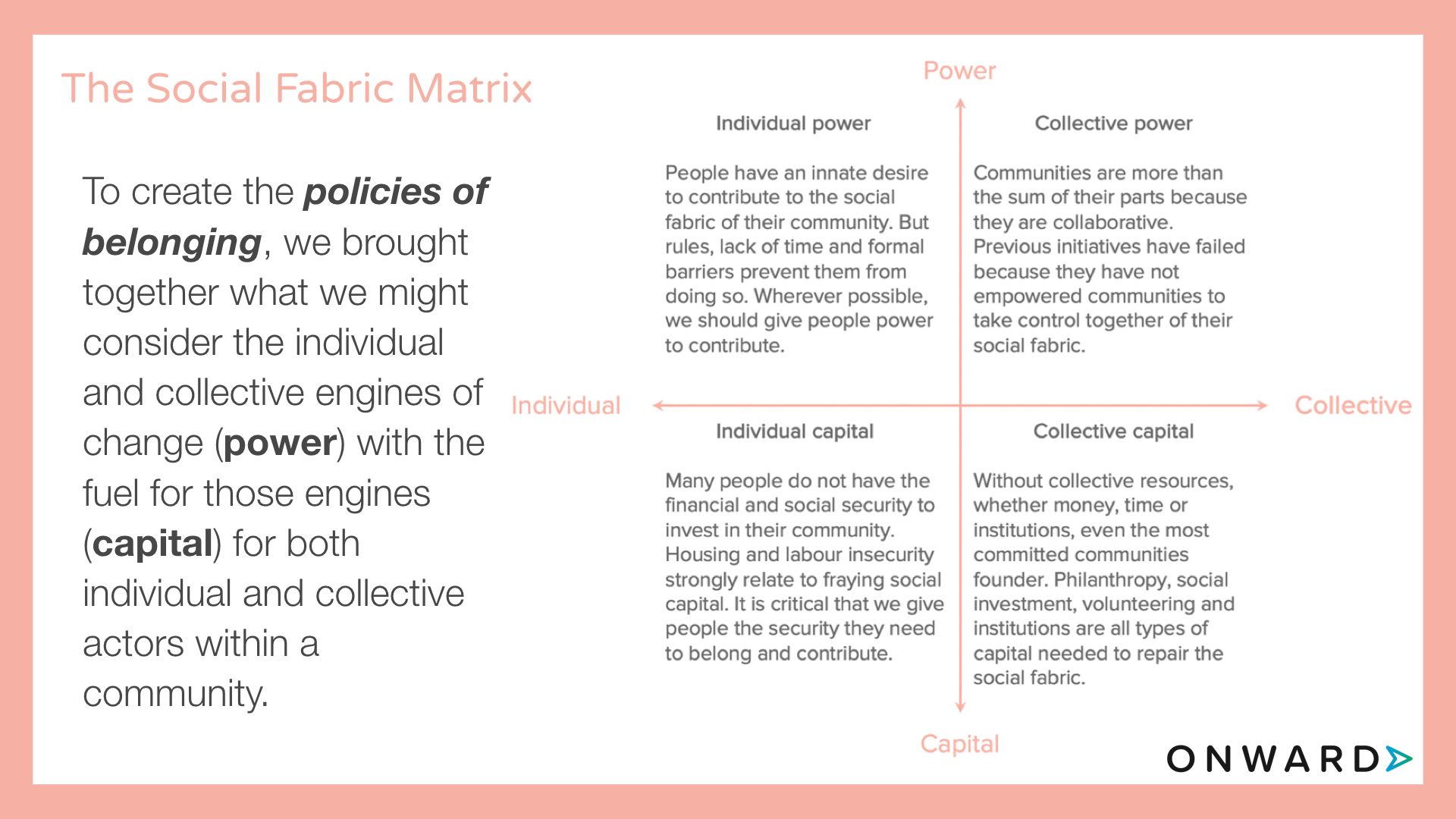A new report has received cross-party backing for its call for ministers to hand power and capital back to communities after the pandemic to repair Britain’s fraying social fabric. The report, published by centre-right thinktank Onward, is supported by a cross-party coalition of MPs and leading civic organisations.
The Government’s flagship levelling up ambition will fail unless Ministers take concerted action to invest in and empower fraying communities after the pandemic, the report argues. The report, The Policies of Belonging, is a response to growing evidence that community is in long term decline in Britain. In 2019, polling for Onward found that 71% of people agree that “community has declined in my lifetime” and in September 2020 the thinktank warned that there has been a steady fall in the last decade in levels of volunteering, local group membership, church attendance, community activities, family trips, philanthropy and social trust. While the pandemic led initially to an outpouring of public spiritedness, this benefited high trust neighbourhoods much more than others.
To rekindle a sense of belonging in all Britain’s communities after lockdown finally ends, Onward sets out a series of policies to give power to individuals and communities to give back locally, and greater resources to ensure that the most fraying communities have strong reciprocal networks and institutions. The main proposals suggest ministers should:
- Give every local area the “right to self government” through a parish or town council. At present, only 25% of England is represented by a parish or town council, compared to 70% of Wales and 100% of Scotland, and many recent attempts to create them have been thwarted by boroughs or districts. In next year’s Devolution White Paper, Ministers should pave the way for the widespread introduction of town and parish councils, while also giving town and parish councils the right to assume ownership of, and responsibility for, green spaces, community sports facilities, community centres and local high street maintenance in their area.
- Introduce a “family tax allowance” to allow partners to transfer their £12,500 tax allowance to their working spouse. This would replace the marriage tax allowance and extend it from the current £1,250 to the full £12,500 tax -free amount. This would recognise families rather than just the individuals through the tax system and allow either partner to commit to child or family care without foregoing their tax allowance – or balance part-time work and familial or community commitments without a penalty.
- Empower communities to secure land for community-led housing to ensure a supply of local affordable or social homes. Few things root people to places than secure housing, so communities should be given the right to establish a community land trust to provide affordable homes for local people. Where social housing waiting lists are excessive or housing is scarce, there should be a new obligation placed on local authorities to identify, purchase and zone suitable land to meet the identified housing need for local people. The report also recommends that Ministers should offer discounted land to private rented tenants who want to self-build their own home, either individually on small plots or collectively across a larger site, in a new discounted “Right to Buy” for renters.
- Introduce ‘Year to Serve’, a civic service scheme to give unemployed young people a paid placement with local charities or social businesses. To mitigate the long-term scarring of unemployment and to build upon the wave of volunteering during the pandemic, the Government should pay young people the national minimum wage to serve their community: tutoring early years pupils to halve the literacy gap, supporting residents of care homes, by planting 30 million trees per year, or boosting English language teaching for migrants. The scheme would easily be introduced alongside the Government’s current Kickstart or developed within it.
- Give workers the ability to draw down a year of their pension early to take a “civic sabbatical” from work to give back to society. This would give people of working age the right to access one year of their pension early in order to give them the financial security to volunteer, start a community venture, retrain or start a local company. They would retire a year later to make up for the working – and contributing – time lost and to maintain fairness in the system.
The report is backed by a large number of MPs, including: Danny Kruger (Con) and Jon Cruddas (Lab) who have led the Parliamentary promotion of the report. In addition to the programme funders – the Joseph Rowntree Foundation, Shelter and Power to Change - the report has also been endorsed by Local Trust, Trust for London, New Philanthropy Capital, Unbound Philanthropy, the Young Foundation, NAVCA (National Association for Voluntary and Community Action) and Catch22 (a 'social business' charity that aims to strengthen local public services).
The report is the latest in Onward’s Repairing our Social Fabric Programme, a major cross party programme launched last year to study the changing nature of community in the UK and to develop ideas for how to strengthen the ties that bind people together at a local level.
Will Tanner, Director of Onward, said:
“Everyone focuses on the impact of lockdown on the economy but the truth is that the pandemic has taken a terrible toll on the social fabric of our lives, compounding the long-term decline of community over recent decades.
“As we emerge – finally – from the pandemic, we need to not just revive a flatlining economy, we need to take steps to empower and recapitalise communities, to give people back a sense of belonging and rekindle the social networks and institutions upon which we all rely.”
Supporting MPs Jon Cruddas and Danny Kruger organised an adjournment debate on the subject of the report the night before its launch, which is reported separately on the Civic Revival website.


